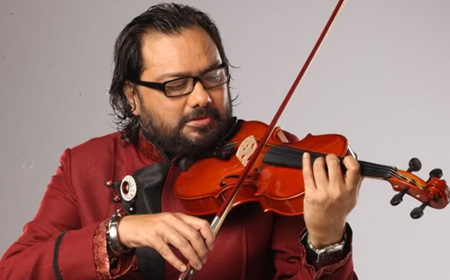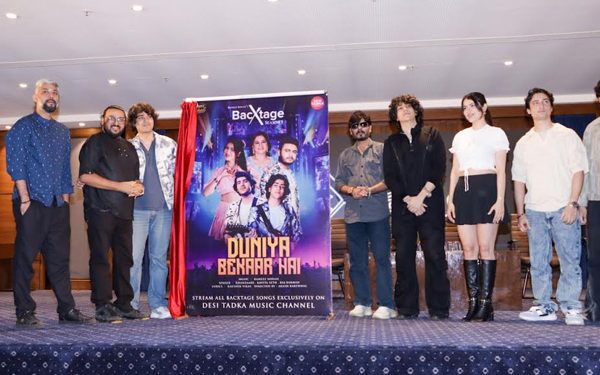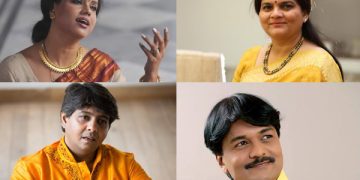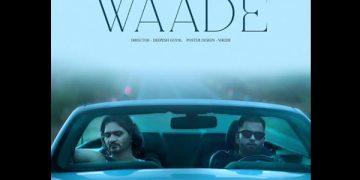MUMBAI: Indian cinema and movies have always complemented each other and helped build a heritage. With the growth of bollywood, music in films has undergone an immense change. However with the adoption of new music, lyrics have been compromised as songs today are devoid of the heritage portrayed in them earlier.
At the recently concluded ‘Cinema 100- The Next Wave’ festival organized by Whistling Woods International Institute of Film, Fashion and Media, on Poetry in Cinema, a discussion was held on 100 years of Music in Cinema by Ismail Darbar, Anuradha Padwal, Ravindra Jain and Sameer Sen.
Highlighting the importance of music, Jain stated that he has seen music grow and Indian Cinema is incomplete without music. Professing his love for the art, he also rendered a special track for the occasion titled ‘Cinema Cinema’.
Padwal acknowledged some part of the contribution to the record label T-Series that brought about a revolution and gave a
platform to newcomers to showcase their talent.
The panel stressed on the fact that the legacy that music has been carrying over the years needs to be taken forward in its original form and not by copying others.
Commenting on the way music is changing, Jain expressed, “We should not give up. Even today it’s only the melodies that work. We should welcome change and go forward with the era, but that does not mean we let go of our culture. Technically, a song should have soul in it or there is no meaning of it. We might find newer technology, but in India tune and lyrics will continue to work.”
As per the discussion, 80 per cent of the music audience is rural and they are the ones that listen to such melodies only. Terming music as a changing season without any barriers, they further stated that even the Western countries have good music but India is known for its culture in music. Ragas and folk music should not be forgotten and focus should be given on presentation to stay ahead in music.
“Maybe we lack in lyrics, but we are very good with instruments. I am sure that the next 100 years for music will be very good. The younger generation also likes melodies but the way of presenting them should change,” Jain highlighted.
Songs with folk tunes and lyrics take a long time to register amongst the youth as there are too many tracks being released altogether today. Thus there is no recall value of songs now as the importance of lyrics has diminished as compared to the golden era. Earlier, the tunes and types of combination with singers and composers worked well and brought in a healthy competition unlike today.
Commenting on the same, Padwal said, “Cinema is a mirror of emotions. Like the lifestyle of people is changing, films and lyrics are also evolving accordingly. But only those songs sustain which connect with us emotionally. Today’s lyrics are not good. I do not understand songs like ‘Fevicol Se’ and ‘Fire Brigade’ and no one will remember them either. Earlier people worked very hard on each song. They would just not listen to something and come up with another track overnight. We should make sure that we give new music but not break our heritage.”
A big example to compare new music with the one created earlier is the recently released film Aashiqui 2. While the songs of the new movie were liked by everyone and it became a rage amongst the audience, many other including the panelists still tune into the earlier Aashiqui and only like that music.
Darbar stated that Gulshan Kumar at that time had a big role in giving music a new beginning and helping it reach where it has today. “Gulshan Kumar had given a new birth to music at that time and he ensured a new found respect to artistes. When he came into the space, music was nearing its end. Today, we are at a similar position and need another Gulshan Kumar,” he said.
Having four generations of his family in music and being one of the closest persons to witness the transition, Sen took on a differentiated viewpoint by saying that times have changed but the new generation is also working well in music. There are still some composers like his son Sohail Sen who composes only melodious tunes and gives opportunity to new talents.
A question raised by the audience was that why is music in India not bigger than films? Padwal stated that music has infact always surpassed films and it has been witnessed that many a times the film has not performed well, but the music has been very popular amongst the audience. Even though individual albums have attained less publicity due to marketing, she insisted that there is a huge market for music in the country.
Talking about the recent positive change for artistes in terms of royalties, Sen mentioned, “The revenues attained from film music is somewhere between Rs 150-300 crore, out of which we do not get anything. Creation of music is the biggest art and now as per the amended act, artistes who have worked in more than 50 films will receive a good sum for their work.”
The session concluded with the discussion that today, there are a lot of boundaries in music and artistes sometimes have to work for people who don’t have music sense but the most important aspect in all films will continue to be music.













